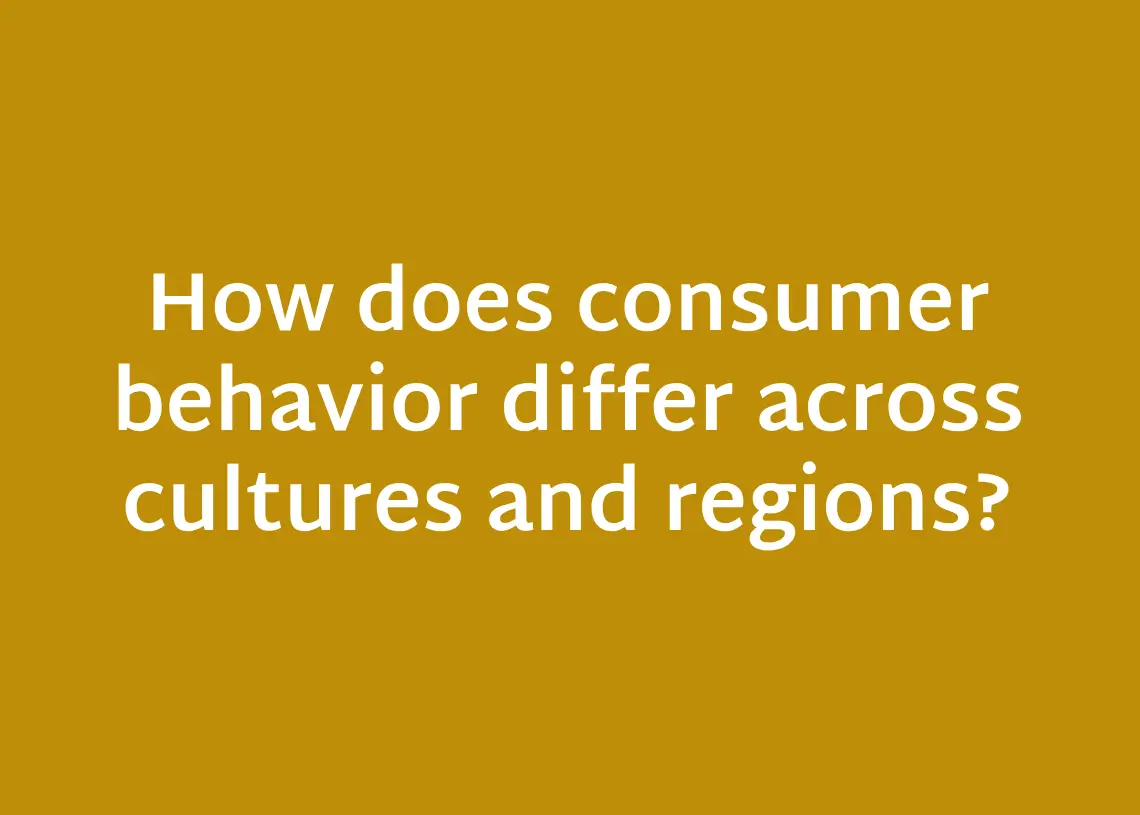Understanding consumer behavior is crucial for businesses to succeed in today’s global market. Companies need to navigate cultural and regional differences to create effective marketing strategies that resonate with their target audience.
Consumer behavior is the study of how individuals make decisions regarding the purchase and consumption of goods and services. Different cultures and regions have unique values, beliefs, and preferences that shape consumer behavior. These differences affect not only what people buy but also how they buy it, how much they are willing to pay for it, and how they use it.
Cultural and regional differences impact not only the products and services that are considered desirable but also the marketing tactics used to promote them. For instance, marketing messaging that might be effective in one region may not resonate with consumers in another. Understanding consumer behavior is, therefore, crucial to tailor marketing strategies to different cultures and regions effectively. This blog post will explore how consumer behavior differs across cultures and regions.
Earn a certificate in your dream career for an affordable price at IAP Career College today!
Culture shapes consumer behavior globally
Culture plays a crucial role in shaping consumer behavior globally, as consumer behavior is not only influenced by factors such as individual experiences and socio-economic status, but also by cultural norms, values, beliefs, and traditions.
The impact of culture on consumer behavior can vary significantly across different regions and cultures, and it is essential for businesses to understand the cultural nuances and differences that exist in different markets if they want to succeed in those markets.
For instance, in some cultures, consumers tend to prioritize family values and collective decision-making, while in others, individualism and autonomy are highly valued. Therefore, businesses need to tailor their marketing strategies and products to align with the cultural preferences and values of their target consumers. Understanding consumer behavior across cultures and regions is critical for businesses to effectively compete in the global marketplace.
Factors affecting consumer behavior worldwide
Factors affecting consumer behavior worldwide are complex and multifaceted. One of the most significant factors is culture. Culture shapes how individuals perceive and interpret the world around them, including their attitudes and behaviors towards products and services.
Another crucial factor is social status, which can influence consumers’ purchasing habits and preferences. Additionally, economic factors, such as income and employment opportunities, can also impact consumer behavior. Finally, technological advancements have led to changes in consumer behavior worldwide, as e-commerce and social media have become increasingly prevalent in many regions.
Understanding these factors is essential for businesses seeking to expand into new markets and increase their global reach. By tailoring their marketing strategies to accommodate cultural differences and local preferences, businesses can effectively engage with consumers worldwide and drive sales growth.
How cultural values influence purchase decisions
Cultural values play a crucial role in shaping the purchase decisions of consumers worldwide. Culture encompasses the shared beliefs, customs, attitudes, and behaviors of a specific group or society. Consumer behavior is significantly influenced by cultural values, which influence various aspects of consumer decision-making, such as product preference, brand loyalty, and purchasing power.
Cultural values differ across regions and countries, and understanding these differences is vital to devise effective marketing strategies. For instance, individualism versus collectivism is a significant cultural value that influences consumer behavior in Western and Eastern cultures differently. Western cultures prioritize individualism and self-expression, while Eastern cultures emphasize collectivism and group harmony.
To effectively navigate the cultural differences in consumer behavior, businesses must conduct thorough market research and develop targeted marketing campaigns that resonate with the cultural values and norms of specific regions and countries.
Regional differences in consumer behavior
Regional differences in consumer behavior can play a significant role in shaping marketing strategies for businesses targeting audiences in different cultures and regions. Consumer behavior is influenced by a range of factors such as cultural, social, economic, and psychological factors, and these factors can vary significantly between regions and cultures. For instance, consumers in Asia tend to place a high value on group harmony and social relationships, whereas individualism is more highly valued in Western cultures.
Similarly, consumers in some regions tend to be more brand loyal and conservative in their purchasing decisions, while others are more open to experimentation and new products. Therefore, understanding these regional differences is crucial for businesses seeking to reach new audiences effectively and develop appropriate marketing strategies that appeal to their target customers.
Local customs and traditions matter
Local customs and traditions play a significant role in shaping consumer behavior across cultures and regions. Every society has its unique set of values, beliefs, and customs that influence consumer behavior. Understanding the local customs and traditions is crucial for businesses that operate in multiple regions or countries. For instance, certain cultures may prefer to bargain and haggle over the price of goods while others may find it impolite. Similarly, some cultures may place greater emphasis on individualism, while others may prioritize collectivism.
A deep understanding of local customs and traditions can help businesses tailor their marketing messages, product design, and customer service to meet the unique needs of each market they operate in. Ignoring these differences can lead to misunderstandings, cultural faux pas, and ultimately, poor business performance. Hence, it is essential for businesses to recognize and respect the importance of local customs and traditions in shaping consumer behavior across cultures and regions.
Language barriers and impact on consumption
One of the key factors that affect consumer behavior across cultures and regions is language barriers. Language differences can have a significant impact on consumption behavior, especially in countries where English is not the primary language.
In such countries, consumers may have limited access to information about products and services that are only available in English. This can restrict their ability to consume products that are not available in their native language. Additionally, language barriers can also impact advertising and marketing campaigns, as messages that are not effectively translated or localized may not resonate with the target audience.
Therefore, businesses that want to expand their reach in different cultures and regions need to consider the language barriers and develop strategies to overcome them. This may include investing in translation services, localization of content, and developing culturally relevant marketing messages that resonate with the local audience.
Understanding consumer behavior in Asia
Understanding consumer behavior in Asia is crucial for any business that wants to succeed in this region. Asia is home to many diverse cultures and languages, which means that consumer behavior can vary significantly depending on factors such as geography, religion, and socio-economic status.
For example, in countries such as China and Japan, there is a strong emphasis on the importance of family and community, which can affect how consumers make purchasing decisions. Similarly, in countries such as India and Indonesia, where religion plays an important role in daily life, consumers may be more likely to make purchases based on religious beliefs.
It is therefore important for businesses operating in Asia to conduct thorough research on consumer behavior in the region, in order to develop effective marketing strategies that take into account the unique cultural and social factors that influence purchasing decisions.
The importance of family values
Family values play a significant role in shaping consumer behavior across cultures and regions. The values and beliefs instilled in individuals by their families can influence their purchasing decisions and consumption patterns. In many cultures, family is considered the foundation of society, and family values such as loyalty, respect, and togetherness are highly prioritized.
These values can translate into purchasing decisions based on family needs and desires. For instance, in some cultures, it is customary to buy gifts for family members during holidays or special occasions, leading to increased consumer spending. Understanding the significance of family values in different cultures and regions can help businesses tailor their marketing strategies accordingly and appeal to consumers on a more personal level.
The role of social media
Social media plays a significant role in shaping consumer behavior across different cultures and regions. The impact of social media on consumer behavior is evident in the way consumers engage with brands, make purchase decisions, and share their experiences with others.
For example, consumers in some cultures may use social media platforms like Facebook and Instagram to research and compare products before making a purchase, while others may rely more heavily on peer recommendations and reviews.
Additionally, social media can also influence the perception of brand image and reputation in different regions, as consumers may have varying levels of trust and perception towards certain brands based on their online presence and social media activity. Therefore, understanding how social media influences consumer behavior across cultures and regions is crucial for businesses to effectively engage with their target audience and build meaningful relationships with their customers.
Adapting to global consumer trends
To succeed in the global marketplace, businesses must understand and adapt to global consumer trends. Consumer behavior can vary greatly across different cultures and regions, and it is essential to recognize these differences to effectively market and sell products or services.
It is important to recognize that cultural and regional differences can impact consumer behavior in terms of purchasing power, preferences, attitudes, and values. By adapting to these trends, businesses can create more effective marketing strategies and tailor their products or services to meet the needs of specific cultures or regions.
This involves conducting market research, understanding the cultural context and customs, and adapting marketing strategies to address cultural sensitivities and preferences. Successful businesses are those that understand and adapt to the diversity of global consumer trends and are able to offer products and services that cater to the unique needs and preferences of different cultures and regions.
Conclusion: How does consumer behavior differ across cultures and regions?
In conclusion, consumer behavior is not a one-size-fits-all concept. Culture and region play a crucial role in shaping how individuals behave as consumers. Understanding these differences is essential for businesses to tailor their marketing strategies to meet the unique needs and preferences of different regions and cultures.
By being aware of these differences, companies can create effective marketing campaigns that resonate with their target audience and drive sales. It’s important for businesses to take a nuanced approach to consumer behavior and constantly adapt their strategies to meet the needs of an ever-changing global marketplace.




